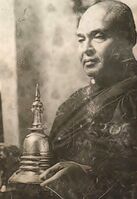Hammalava Saddhatissa
| PersonType | Category:Translators |
|---|---|
| FirstName / namefirst | Hammalava |
| LastName / namelast | Saddhatissa |
| MainNamePhon | Hammalava Saddhatissa |
| SortName | Saddhatissa, Hammalava |
| bio | Hammalawa Saddhatissa Maha Thera (1914–1990) was an ordained Buddhist monk, missionary and author from Sri Lanka, educated in Varanasi, London, and Edinburgh. He was a contemporary of Walpola Rahula, also of Sri Lanka.
The Maha Bodhi Society invited Saddhatissa to become a missionary (dharmaduta) monk in India like his contemporary Henepola Gunaratana. In order to teach to Indians he learnt Indian languages such as Hindi, Urdu and Punjabi. While in India, he came to know B. R. Ambedkar, who reportedly obtained advice from him on how to draft the Indian constitution along the lines of the vinaya. He also obtained an M.A. Degree from the Banaras Hindu University and then became a lecturer there. In 1957 he traveled to London at the request of the Maha Bodhi Society and lived the rest of his life in the West. He obtained his PhD from the University of Edinburgh and held academic appointments at a number of universities. He was a visiting lecturer in Buddhist studies at Oxford University; a lecturer in Sinhala at the University of London; and Professor of Pali and Buddhism at the University of Toronto. He was a Buddhist Chaplain at the London University and a vice president of the Pali Text Society. At the time of his death he was the head of the London Buddhist Vihara and the Head of the Sangha (Sanghanayaka) of the United Kingdom and Europe of the Siam Nikaya of Sri Lanka. He was posthumously honored in 2005 by Sri Lanka with a postage stamp bearing his image. Due to spending years at SOAS, University of London, Saddhatissa developed a sensitivity to Western philosophical discourse. He thus developed his thought, specifically in Buddhist ethics, with both traditional training and Western thought in mind. His primary Western influence (in Buddhist Ethics at least) appears to be Fyodor Shcherbatskoy, followed by the French philologist Louis de La Vallée-Poussin. His main interest was in staying close to the 'lived expression' of Buddhism as opposed to abstract academic theorizing. (Source Accessed Apr 13, 2021) |
| YearBirth | 1914 |
| YearDeath | 1990 |
| phduniversity | University of Edinburgh |
| education |
|
| IsInGyatsa | No |
| Other wikis |
If the page does not yet exist on the remote wiki, you can paste the tag |

